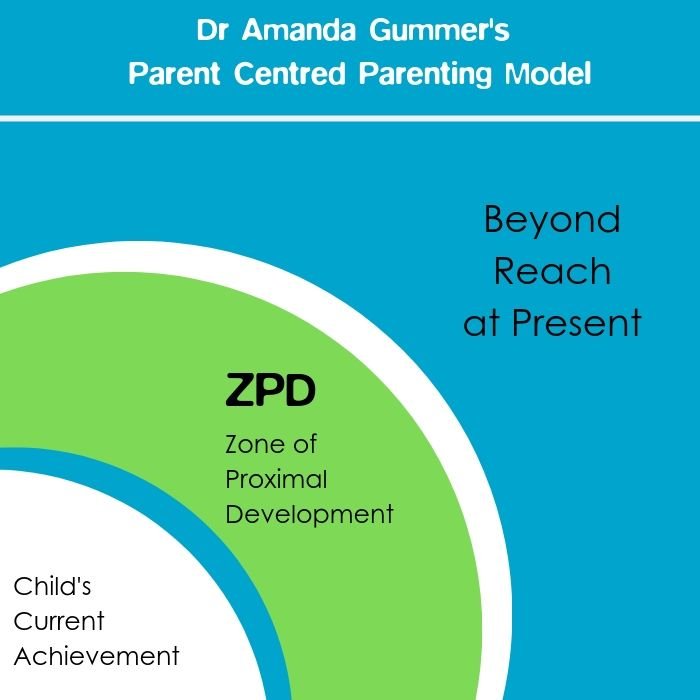The Science behind the Parent Centred Parenting Model
The Parent Centred Parenting Model, developed by Dr Gummer is based on research and psychological studies done by several well-respected experts in their fields interpreted in the light of modern family life.

A Look at Development
Lev Vygotsky put forward that each area of development can only be advanced so far and progresses more rapidly with appropriate support.
Developing knowledge or skills beyond this zone is not something a child can do until a later time. This buffer zone of achievable skills/knowledge is known as the Zone of Proximal Development (ZPD).
It illustrates the fact that many skills or concepts are out of a child’s reach until they have developed certain prior ability. This zone, however, is constantly changing, even throughout one day.
An example of this flow of progression is a child learning to write. They do not start by picking up a pen and making legible marks, they first progress through gross motor development such as painting with a large brush and refining that skill with practice and support.
Key points to remember about Child Development:
- Each individual differs in their capacity to learn
- Their zone of attainable development changes due to their environment.
- Support or ‘scaffolding’ helps children progress through the ZPD more quickly
- Areas of development overlap and reinforce each other
Understanding Intelligence
Research suggests there is no such thing as a single ‘Intelligence’ and this word covers a wide variety of attributes.
Howard Gardner proposed a multiple intelligence theory where the diverse areas of intelligence a person will have are separated and there is, according to Gardner, little or no correlation between intelligence levels in each area.
This explains why we all have different skills and abilities and opens up the idea of intelligence to include other skills that are not included in assessments of traditional views of intelligence.
Gardner’s ‘Intelligences’ are as follows:
- Linguistic Intelligence encompassing speech and language.
- Logical-Mathematical Intelligence covering logical thinking and problem-solving.
- Musical Intelligence in tone, pitch and rhythm.
- Bodily-kinesthetic Intelligence in using mental abilities to coordinate physical movement.
- Spatial Intelligence covering spatial awareness and patterns.
- Inter- and Intrapersonal Intelligence which allows a person to interact well with others and the ability to understand one’s own self.
- Naturalist Intelligence for nature and how a person interacts with their environment.
Children can develop faster and excel in some categories more than others and each child will be unique in the way they develop these.
How did this Research Shape the Parent Centred Parenting Model?
Development is individual and complex and the research proved that formal direction by parents to force a child’s development is not ideal.
Children develop better and reach their potential when given good role models to copy and learn from. A study by Thomas and Chess concerning ‘Goodness of Fit’ shaped the Parent Centred Parenting Model by showing that children need to feel they ‘fit’ within their family.
An avid reader, for example, is more likely to excel in a home environment where books are accepted and appreciated.
It is important to allow and support a child’s natural preferences for their own development.
Choosing a Parent Centred Parenting Lifestyle
Following the Parent Centred Parenting Model ensures that parents create an environment where children see their choices and values are accepted because of the parent’s model this themselves, looking after their own needs as well as nurturing the rest of the family.
If a child feels valued and has parents who value themselves, then they will copy such behaviour and create a virtuous circle where they will parent in a respectful, nurturing, parent-centred way, giving their own children a healthy model to copy.


